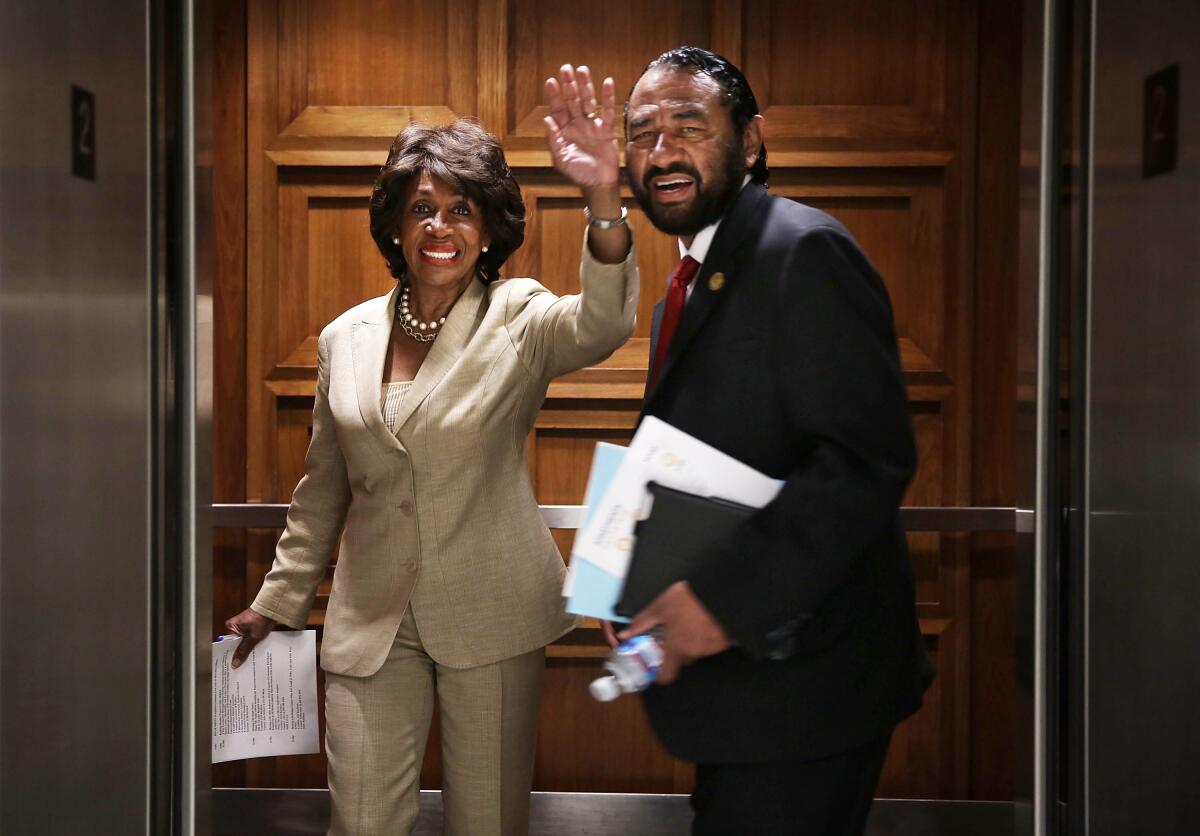Opinion: The Trump impeachment vote that few Democrats wanted

- Share via
Hoping to stop Democrats from sweeping into the House majority last year, Republicans tried to persuade voters that the 2018 midterms were the “impeachment election” — as in, if these guys get control of the House gavel, they will impeach President Trump. We can’t tell yet whether that prediction will come true, but on Wednesday, the House will at least consider the possibility. And then lawmakers will almost certainly reject it.
(Update: They did, by a vote of 332-95, with one abstention.)
Rep. Al Green (D-Texas), a vocal critic of the president, is forcing a vote (through a quirk in the House rules) on a resolution to impeach Trump for his recent “racist comments” about four progressive House Democrats “that have legitimized and increased fear and hatred of new Americans and people of color.” The remarks, which the House formally condemned on a near-party-line vote Tuesday evening, demeaned the presidency, demonstrated Trump’s unfitness for office and sowed the seeds of discord among the public “to the manifest injury of the people of the United States,” Green’s resolution states, concluding that they amounted to a “high misdemeanor.”
Every House Democrat and at least a few of the chamber’s Republicans would agree with Green’s critique of Trump. But it’s fair to say that this resolution — whose one article is silent on Trump’s alleged obstruction of justice, conflicts of interest, attacks on important institutions, failures to faithfully execute the law and routine public deceptions — is not the one that impeachment advocates have been straining at the bit to vote on.
Green, who also forced (unsuccessful) votes on two resolutions to impeach Trump while Republicans controlled the House, evidently felt that now is the time to strike, given the public outcry against Trump calling on the four Democrats, all of them minorities, to “go back and help fix the totally broken and crime infested places from which they came.”
But as House Speaker Nancy Pelosi (D-San Francisco) has argued, impeachment needs to be a bipartisan exercise. Otherwise, you’d rip the country apart. And as demonstrated by Tuesday’s vote on the resolution to condemn Trump’s remarks, only a tiny fraction of the House GOP caucus is ready to consider impeachment; Tuesday’s resolution was supported by only four of the chamber’s 197 Republicans and its sole former-Republican-turned-independent, Justin Amash of Michigan.
Some of Trump’s critics argue that the House should begin impeachment hearings because the evidence produced there about the president will help persuade more Republicans in the House and at home to support removing him. That happened during the Watergate hearings in 1974, when a majority of Americans came to believe that it was time for President Nixon to go.
But as a Pew Research Center report points out, the process of shifting public opinion about Nixon started long before that. Oversight hearings in the House and Senate before the actual impeachment process were instrumental in that evolution. That’s the sort of thing the House Judiciary, Oversight and Ways and Means committees are engaged in now, pursuing a variety of leads generated by special counsel Robert S. Mueller III’s report and media scrutiny of Trump.
In that sense, Green’s push seems premature. So a likely outcome for Green’s proposal is that House Democrats will vote to refer it to the House Judiciary Committee, which will wait to act until it has more to go on than just last weekend’s spate of ugly tweets.
More to Read
Updates
2:56 p.m. July 17, 2019: This post was updated to reflect the House vote on the impeachment resolution.
A cure for the common opinion
Get thought-provoking perspectives with our weekly newsletter.
You may occasionally receive promotional content from the Los Angeles Times.











